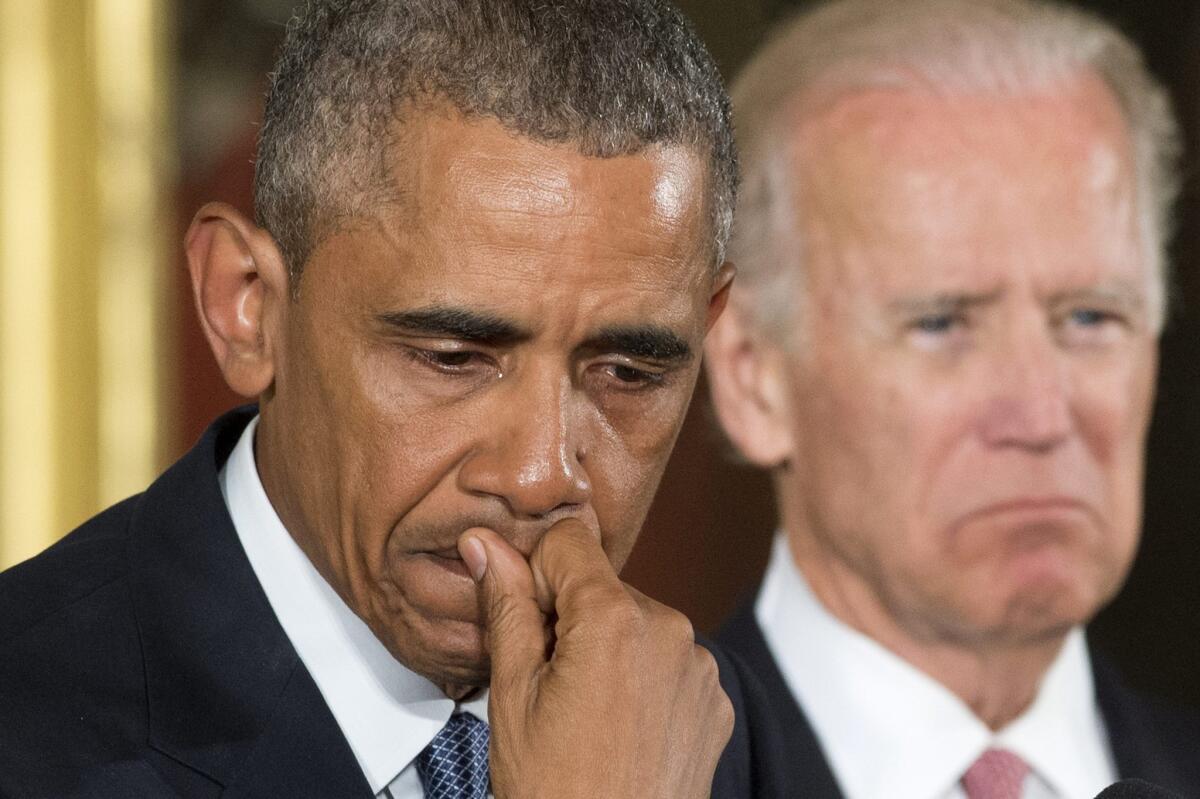Editorial: With gun epidemic raging, Obama finally bypasses Congress

During a White House address, President Obama becomes emotional while announcing executive actions designed to reduce gun violence.
- Share via
Even before President Obama unveiled his plans for tightening federal gun regulations this week, the pro-gun crowd was in a foaming fury. New Jersey Gov. Chris Christie said the president was acting “as if he’s a dictator.” Donald Trump vowed to “unsign” the executive actions, which he described as part of “as an assault on the 2nd Amendment.” House Speaker Paul D. Ryan called Obama’s moves a “dangerous level of executive overreach.”
Polls regularly find that a majority of Americans -- including gun owners -- support mandatory background checks for all gun purchases.
The reality is much tamer. Obama’s modest steps, which the president detailed in a tearful speech Tuesday morning, will force nearly everyone engaged in selling firearms — including online sellers and small-scale vendors at gun shows — to become licensed federal gun dealers. That in turn will require them to conduct background checks on their customers to ensure that they are not barred from buying firearms because of felony convictions, domestic violence issues, drug addiction or other factors that Congress has said make people ineligible to own a gun. Under Obama’s executive orders, the Bureau of Alcohol, Tobacco, Firearms and Explosives is finalizing new rules that would make it harder for people to avoid a background check by buying a gun in the name of a trust or corporation.
The president also intends to devote more resources to improving the National Instant Criminal Background Check System database, enforcing existing gun laws, and helping the mentally ill get treatment while streamlining the process through which their names are added to the database (some of those steps include expenditures that will require congressional approval). And Obama wants to leverage the buying power of the federal government — the largest purchaser of weapons in the country — to persuade gun makers to develop more “smart gun” technology that could reduce accidental shootings and make it harder for criminals to use stolen guns.
There’s nothing onerous about any of those measures and they should by all means be implemented. But because they are executive actions — and because Congress has steadfastly refused to work with the president to pass common-sense gun control laws — much more still needs to be done. A more reasonable Congress would require universal background checks for all transfers of guns anywhere in the nation; would repeal the law that allows dealers to complete a sale after three days even if the background check isn’t complete; would ban sales of military-style rifles and high-capacity magazines; would allow federal funding to be used for research into gun deaths as a public safety issue (now effectively barred by Congress); would prohibit sales of guns to people convicted of stalking; and would crack down on “straw purchases” by legal buyers acting as fronts for others, which authorities say is how the San Bernardino killers obtained their rifles.
But Congress, under the iron grip of the National Rifle Assn., isn’t moving. Even in the emotional aftermath of the 2012 Sandy Hook Elementary School massacre, in which 26 people, 20 of them children, were killed, the NRA managed to bring enough pressure to bear on the Senate to kill a bipartisan compromise to widen background checks.
Polls regularly find that a wide majority of Americans — including gun owners — support mandatory background checks for all gun purchases, even as they shy away from more direct measures. And there have been successes in passing reasonable laws at the state and local level. California, for instance, requires nearly all gun transfers to be handled by a state-licensed dealer who must fill out a “dealer record of sale,” which the state attorney general’s office uses to conduct a background check. Los Angeles recently adopted laws barring possession of ammunition magazines that hold more than 10 cartridges and requiring handguns be locked away or fitted with trigger locks if not in the immediate vicinity of the owner.
But the core issues here are national in scope and require a reasoned national approach. How to get there is one of the most vexing political issues of our time. And it is one with a grotesque human cost, with more than 30,000 people killed each year in gun-related suicides, homicides and accidental shootings. At some point, the American people need to inform their leaders that this price is just too high to pay.
More to Read
A cure for the common opinion
Get thought-provoking perspectives with our weekly newsletter.
You may occasionally receive promotional content from the Los Angeles Times.









